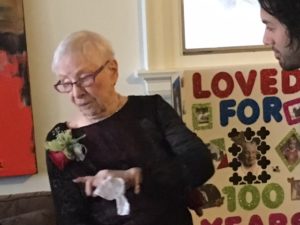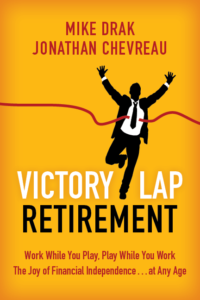
My latest MoneySense Retired Money column was published today. Click on the highlighted text for the full piece: Retirement planning is about more than money.
The piece is based on a recent Seniors’ Luncheon hosted by the Toronto church I attend and as you will read, I was struck by how the experiences of these seniors — who ranged in age from 82 to 100 — reinforced the theme of my recently released co-authored book, Victory Lap Retirement.
In short, every senior at the table believed in continuing to work in some fashion even in their looming old age. Including 100-year-old Meta, pictured. While I changed the names of the other seniors in the article, Meta is a real name and used there and here with her permission.
Here’s the thing. Until she suffered a hip injury earlier this year, Meta was still working one or two half-days a week at a nearby printing firm. And at her 100th birthday celebration earlier this month, this continued work connection meant several of the people celebrating with her were from work, as well as the church, neighbours and various other circles.
 And now that the din over her 100th birthday milestone has subsided, Meta told me last week that she wanted to return to work one day a week, because she misses her co-workers and she likes to get out of the house (she lives in the top floor of a house overlooking Lake Ontario, and has been there since the 1960s. The last thing she would want would be to move to an institution catering to seniors.)
And now that the din over her 100th birthday milestone has subsided, Meta told me last week that she wanted to return to work one day a week, because she misses her co-workers and she likes to get out of the house (she lives in the top floor of a house overlooking Lake Ontario, and has been there since the 1960s. The last thing she would want would be to move to an institution catering to seniors.)
The danger of retiring “too soon”
As for the senior men I chatted with that day, one regretted having voluntarily retired “too soon” at the tender age of 58: Kevin (not his real name) said he did so because he had a good teacher’s pension but when his wife passed away soon after, found himself with too much time on his hands.
Another senior now in his late 80s had been forced to retire at age 65, which used to be standard procedure among employers until the law was changed. He told me he would have preferred to have kept working a few more years if he had had a choice. As it is, he keeps his body fit with regular exercise and his mind active playing, among other things, card games like Bridge and Poker.
Then there was the couple I called Jean and Bob, who experienced the reality of just how much quality time couples spend together once both are retired.
Earlier this week, BBC and many other media ran a piece on an Australian centenarian — David Goodall, aged 102 — who still works as a scientist at a university in Perth, although the university had relocated him to reduce his commute. Coupled with what I learned at the Seniors’ Luncheon, it reinforced my conviction that my coauthor’s description of Victory Lap Retirement as “a retirement book about NOT retiring” is not that far off the mark.
And just yesterday, I met with a group of financial writers and money managers for a pre-Christmas catchup: two were aged 69 and 70, both still working: one showed me his first CPP cheque from Ottawa (he’d waited as long as possible), from which he had deducted half for taxes. Another, a somewhat younger financial journalist and former colleague who had inherited a goodly sum, is now dabbling with driving a taxi for Uber.
Maybe you only THINK you want to retire
 The problem with the full-stop retirement promoted for so long by the financial industry and the media is the “all-or-nothing” nature of the premise. To be sure, many of us are so exhausted from decades of “slaving and saving” in corporations that we may think we want to retire. But in reality, we may need only a sabbatical or long vacation to refresh our souls.
The problem with the full-stop retirement promoted for so long by the financial industry and the media is the “all-or-nothing” nature of the premise. To be sure, many of us are so exhausted from decades of “slaving and saving” in corporations that we may think we want to retire. But in reality, we may need only a sabbatical or long vacation to refresh our souls.
There surely will come a time when full-time employment begins to pale — or just as likely, full-time employers may pale on YOU! — but that doesn’t mean you can’t “design a life from which you don’t have to retire,” (to crib a line from the book.) You may no longer want to commute 49 weeks a year and put up with bosses, performance reviews, sales targets, endless meetings and all the rest but that doesn’t mean you have to resign yourself to spending your remaining days in a rocking chair.
You can go back to school, pursue an encore career, work part-time and volunteer a few days a week: the permutations and combinations are endless and ultimately every one of us will have our own Victory Lap story to tell.
This will be the last blog I personally write before Christmas (guest blogs will continue to run almost daily) so to all readers, contributors and their loved ones, I wish a very festive holiday season. And be careful about distracted driving, whether that distraction is generated by smartphones or other brain-altering substances.

